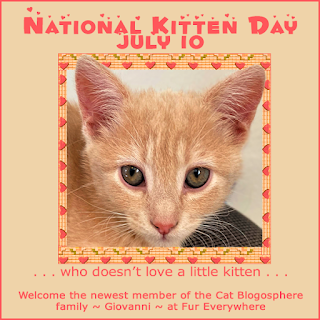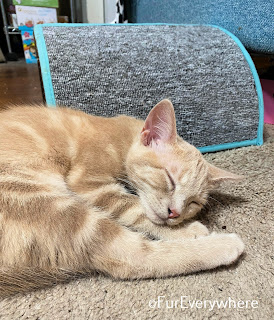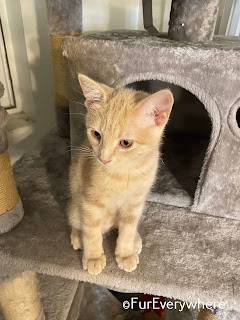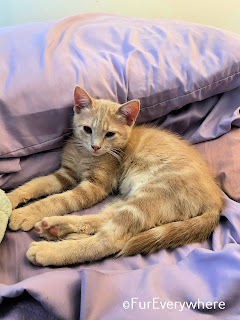Kittens. Tiny, adorable fuzzballs. Their big, innocent eyes, tiny pink toes, and sweet mews make them irresistible.
Today, July 10th, is National Kitten Day. Colleen Paige, pet lover, animal behaviorist, pet and lifestyle expert, and author created National Kitten Day in 2012 to celebrate the joy kittens bring to our lives and to raise awareness of all the kittens who need rescuing.
In celebration of the adorable little fuzzballs kittens are, here are some interesting facts you may not know about them.
13 Facts About Kittens
Kittens Are Born with Their Eyes and Ears Closed: Kittens are born deaf and blind. A kitten's eyes and ears open between two and 15 days of age. A kitten's eyes may not open at the same rate. Even after their eyes open, a kitten's vision is initially poor and improves in the first few weeks of life.
All Kittens Have Blue Eyes: All kittens are born with blue eyes because the melanin that gives the eyes their color is absent at birth. Once a kitten's eyes are open, melanin production increases and the eyes begin to darken into their true color. Their true eye color appears at approximately eight weeks of age. A kitten's eyes may continue to darken until they reach six to 18 months of age.
Kittens Weigh 3-4 Ounces at Birth: Kittens weigh a mere three to four ounces at birth - that's the weight of 15 United States quarters, four alkaline AA batteries, or a standard deck of playing cards. Kittens gain weight quickly - they gain approximately four ounces per week. They should gain about one pound each month until they reach six months of age.
Kittens Need Colostrum to Develop Healthy Immune Systems: For the first few days after a mother gives birth, her mammary glands produce colostrum, an antibody-rich fluid that's important for a kitten's immune system development. A mother's colostrum provides kittens protection from certain infections for several weeks after birth. A kitten who doesn't get colostrum may not develop a healthy immune system.
Kittens Need Help to Use the Bathroom: Kittens cannot urinate or defecate on their own at birth. They need their mother to lick their nether regions to stimulate these bodily functions. Kittens begin to urinate and defecate on their own at about three to four weeks of age.
Kittens Are Born Toothless: Kittens, like human babies, are born toothless. A kitten's deciduous (baby teeth) begin to come in at approximately three weeks of age. At 14 weeks of age, kittens begin to lose their baby teeth, starting with the incisors. A kitten will have all of his adult teeth by the time he's six months old.
Kittens Need to Eat a Lot: A kitten's nutritional needs are different than an adult cat's. Kittens grow fast and need extra protein, fat, and nutrients to support their bodies. If you are caring for an orphaned newborn kitten, he needs to be fed every two hours. If a newborn doesn't get enough to eat, he can develop life-threatening low blood sugar.
Kittens are usually adopted out between eight and 12 weeks of age. A kitten six to sixteen weeks of age needs to eat every six to eight hours if you are not free-feeding. It's recommended that you feed your kitten three meals a day until he reaches six months of age. Once he is six months old, you can feed him twice a day if you're not free-feeding.
Kittens Have a Superior Sense of Smell: A cat's sense of smell is very important to him; he uses it to identify people, other cats, and objects in his environment. Cats have an extra organ involved with their sense of smell known as the vomeronasal organ. The vomeronasal organ is fully developed by the time a kitten turns four weeks of age. A cat has more than 20 million odor sensors in his nose while humans have five million. A cat's sense of smell is far better than ours, so try to be sensitive to your cat's delicate sense of smell throughout his life.
Kittens Develop Hearing Far Better Than Ours: A cat's sense of hearing is also far superior to ours. A kitten is born with his ears closed, but by the time he reaches four weeks of age, his sense of hearing is fully developed. Whereas humans can hear 20,000 hertz, cats can hear 65,000 hertz. A cat's sense of hearing even exceeds a dog's, a dog can hear 45,000 hertz. Cats can also hear noises four to five times farther away than humans can.
Kittens Cannot Thermoregulate: Kittens cannot keep themselves warm until they are approximately four weeks old. If a kitten has no mother to keep him warm, hypothermia becomes a serious risk. You can read more about how to keep an orphaned newborn kitten warm at the National Kitten Coalition.
Kittens Need to Be Socialized with Humans and Other Cats: Kittens need to be around their mother and littermates as well as humans in their first several weeks of life. Interacting with their mother and littermates helps kittens learn how to be cats, how to send and receive important signals, and how to play. Kittens learn a lot about interacting with humans by watching their mothers, so a well-socialized mom is more likely to have well-socialized kittens. It's important to spend time playing with, petting, and handling your kitten daily to help him form good and trusting bonds with humans.
Kittens Can Have Kittens: Did you know that a female cat can reach sexual maturity and become pregnant as early as four months of age? It's true. Kittens can have kittens. Fortunately, spay and neuter surgeries can be done as early as eight weeks of age.
Fleas Can Cause Life-Threatening Anemia in Kittens: Fleas can cause life-threatening anemia in young kittens. It's not safe to use most flea and tick preventatives on kittens until they're at least eight weeks old. If you notice that your kitten has fleas, consult with your veterinarian on what you can use to safely bathe him.
10 Facts About Giovanni
Now that you know more about kittens in general, I thought it would be fun for Giovanni to tell you a few facts about himself, so I'll turn it over to him now.
Hi everyone! It's me, Giovanni!
I thought that you might like to know more about me since I have been in my forever home for a whole month now.
1. I was born on March 29, 2023.
2. I had three littermates - one orange and white brother, one calico sister, and one long-haired gray sister.
3. I love to climb! The day my human mom came to meet me, I was trying to climb over my kitten barrier. I love to climb up as high as I can go.
4. My favorite toys are balls - balls that light up, balls that chirp, balls with bells in them - if it rolls, I want it!
5.I love my big brother, Tylan. I wrestle with him all the time. I also love to play with his tail!
6. I like tummy rubs! Mama doesn't know if I am just that way or if I am trying to be like Tylan.
7. I really love to chew on...everything! I especially like to try to chomp on electrical cords and plastic. I cannot tell you how many times a day Mama says, "Giovanni, that's not food!"
8. I like to sling litter all over the bathroom.
9. Mama named me Giovanni because it means, "Gift from God," which I am.
10. I love to chew on Mama's hair, but she doesn't let me.
How You Can Help Kittens
Giovanni and all his littermates are lucky. They found loving homes to go to. Sadly, not all kittens are so lucky.
While there are no estimates on kittens specifically, the ASPCA estimates that approximately 6.3 million companion animals enter animal shelters nationwide each year. Of those, 3.1 million are dogs and 3.2 million are cats.
When you're ready to add a furry friend to your family, please consider adopting a kitten or two. Kittens do well in pairs.
If you're not able to adopt, you can help kittens by fostering or participating in TNR (trap-neuter-return) programs. Volunteering with a local shelter or rescue is also a wonderful way to help homeless kittens and cats.
What's your favorite thing about kittens? Please tell us why you love kittens in the comments!








Yay, Giovanni!Yay, Giovanni!
ReplyDeleteAwww. My favorite picture is the one of Tylan and Giovanni sunbathing in the window!
ReplyDeleteThat was the purrfect post for National Kitten Day and you two are wonderful brothers together!!!
ReplyDeleteGiovanni is just off-the-charts cute!
ReplyDeleteGreat post. Nice to learn more about you Giovanni. XO
ReplyDeleteKittens are fragile little beings, and I'll love on kittens any time I can get my hands on some.
ReplyDeleteGiovanni, you are full of energy!
What a wonderful blog filled with knowledge all people need. Many times you can find a tiny morsel of a kitten and not have the slightest idea what to do. I wish this blog was a leaflet set in Vet's offices for patient parent education.
ReplyDeleteSo wonderful to learn more about you, cutie! And I didn't know many of these facs!
ReplyDeleteHappy Giovanni Day! Thanks for all the great info on kittens, too. XO
ReplyDelete